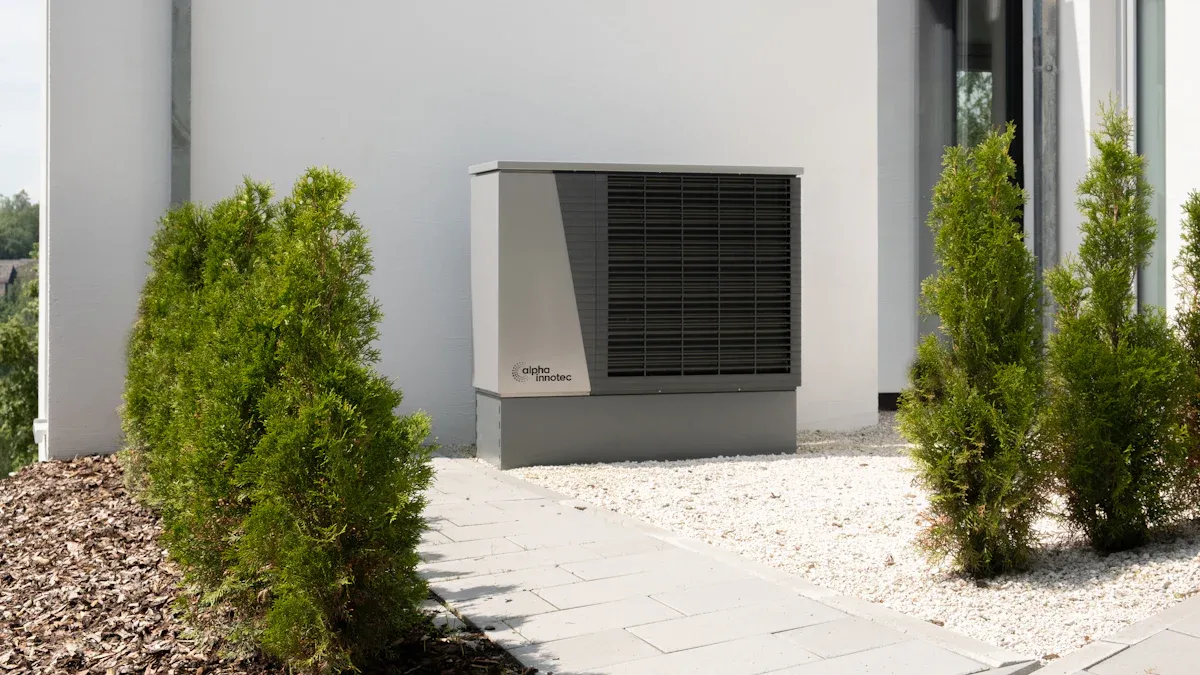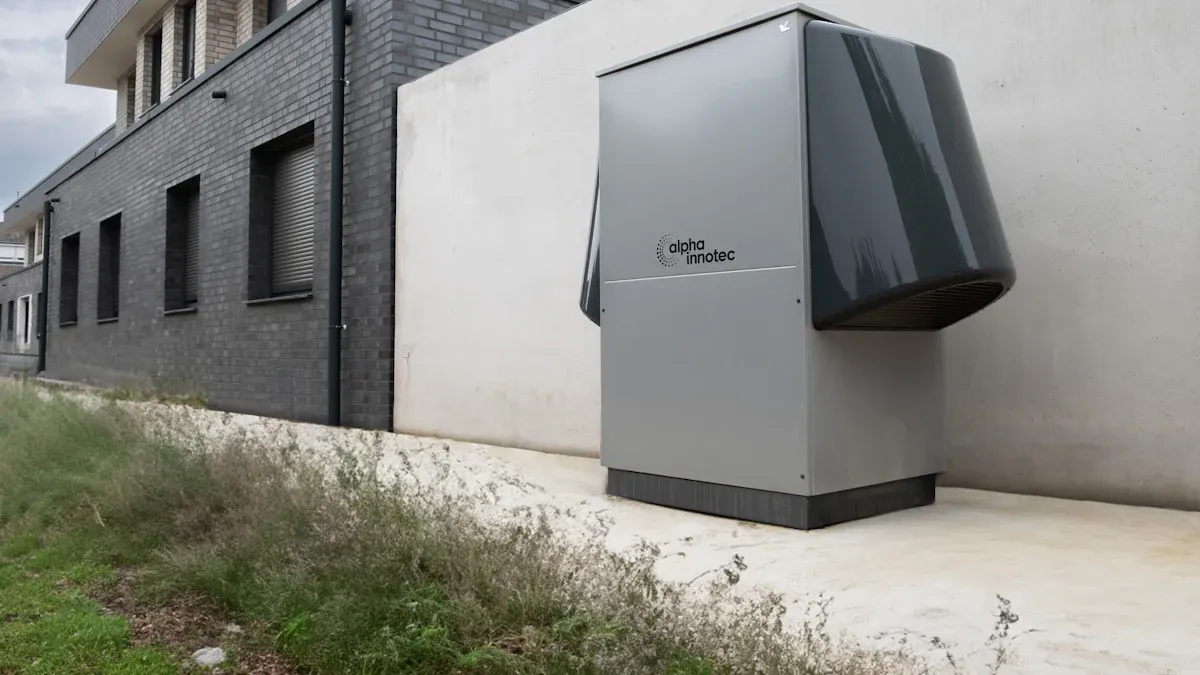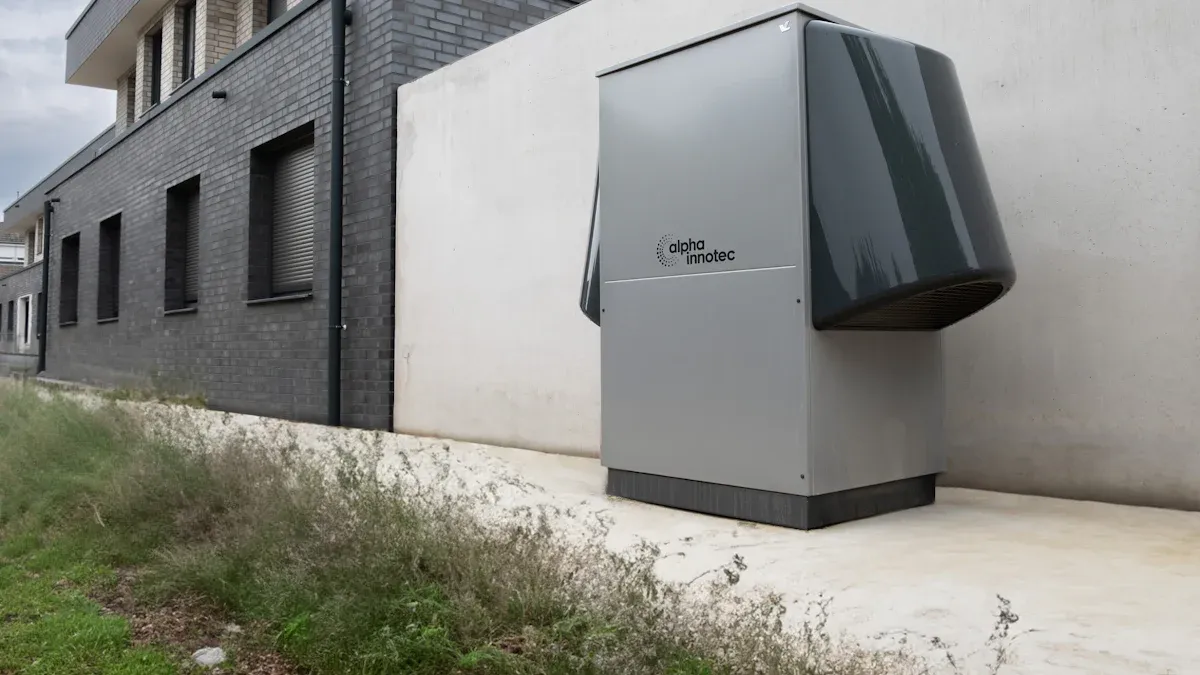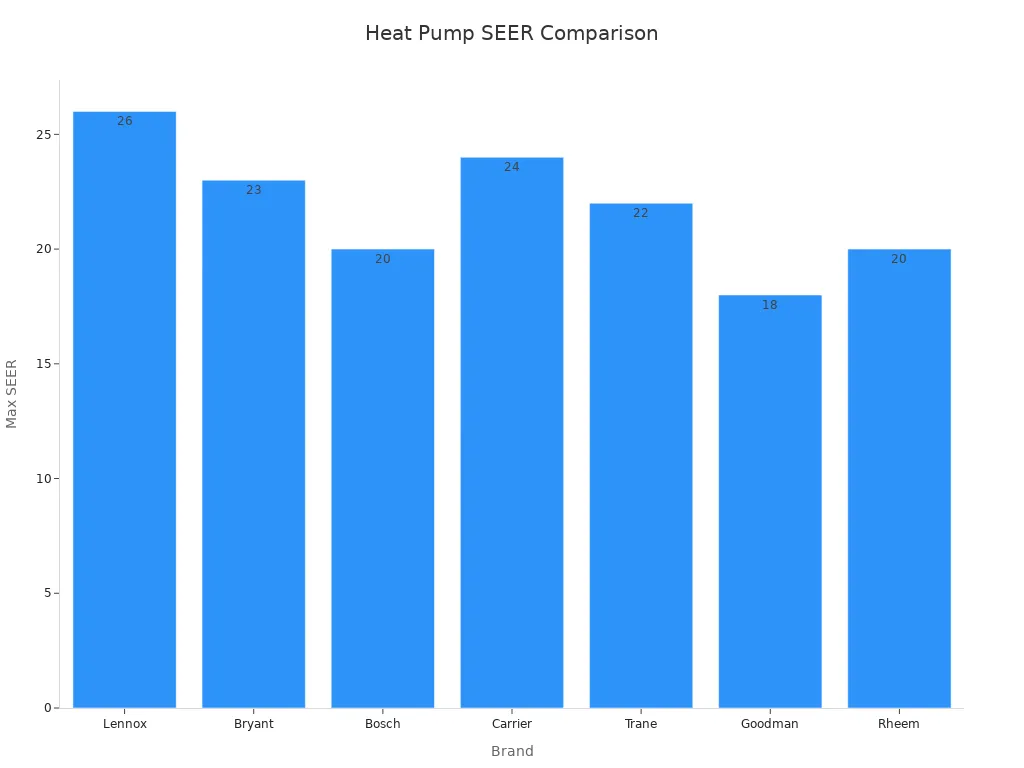Top 10 Heat Pump Manufacturers 2025

Here are the top 10 heat pump manufacturers for 2025: Carrier, Mitsubishi Electric, Daikin, Trane, Bosch, Lennox, Rheem, LG, American Standard, and Guangdong New Energy Technology. These leaders stand out for their innovation, efficiency, and reliability. You’ll notice that efficiency keeps rising—SEER2 ratings now reach 16.5, and modern heat pumps deliver over 200% energy efficiency. As you compare the top 10 heat pump manufacturers, think about your own needs. Residential users make up about 60% of the market, but commercial and industrial needs matter too. New EPA refrigerant standards and smart features shape your options.
Key Takeaways
Top heat pump brands like Carrier, Mitsubishi Electric, and Daikin lead with innovation, efficiency, and reliability.
Modern heat pumps offer high energy savings, with some models reaching over 200% efficiency and SEER2 ratings up to 26.
Smart features like Wi-Fi controls and inverter technology make heat pumps easier to use and more efficient.
Choosing the right heat pump means matching size, efficiency, and features to your home or business needs.
Proper installation and regular maintenance help your heat pump last longer and save more on energy bills.
Top 10 Heat Pump Manufacturers

When you look for the best heat pump brands, you want to know which companies lead the industry. The top 10 heat pump manufacturers for 2025 stand out for their innovation, reliability, and global reach. Let’s dive into what makes each of these heat pump brands unique and why you might consider them for your home or business.
SolarEast
SolarEast has made a name for itself as a leader among residential heat pump manufacturers. You’ll find their products in homes across Asia and Europe. SolarEast focuses on eco-friendly solutions, using advanced technology to boost efficiency and lower energy bills. Their heat pumps often feature smart controls, making it easy for you to manage comfort from your phone. SolarEast’s commitment to green energy helps you meet new EPA standards while keeping your home comfortable year-round.
Mitsubishi Electric
Mitsubishi Electric stands out for its innovation and global presence. You might notice their ductless systems in both homes and offices. Mitsubishi Electric leads the industry in patent applications, showing a strong focus on research and development. Their products offer flexibility, high efficiency, and quiet operation. If you want a system that adapts to your needs, Mitsubishi Electric gives you options for both residential and commercial spaces. Their reputation for reliability makes them one of the best heat pump brands worldwide.
Daikin
Daikin is a giant in the HVAC world. You’ll see their products in homes, offices, and factories across several continents. Daikin’s broad range includes advanced heat pumps and chemical sector products, showing true global reach and product diversity. They lead in innovative HVAC technology, always pushing for better comfort and efficiency. Daikin’s strong market share and focus on sustainability make them a top choice among both residential heat pump manufacturers and commercial heat pump suppliers.
Trane
Trane is a name you can trust for both homes and businesses. They use variable-speed technology to cut power use and give you precise temperature control. Trane’s products often appear in customer satisfaction surveys as some of the most reliable in the industry. If you want a system that lasts and performs well, Trane is a solid pick. Their focus on innovation and energy savings helps you stay ahead of rising energy costs.
Bosch
Bosch brings German engineering to the world of heat pumps. You’ll find their products in homes and businesses that value high efficiency and eco-friendly design. Bosch focuses on sustainability, making their heat pumps a smart choice if you care about the environment. Their products meet strict European quality standards, and their reputation for reliability stretches across the globe. Bosch is a favorite among commercial heat pump suppliers who want dependable, green solutions.
Lennox
Lennox is a leader in the U.S. market, known for its solar-compatible heating and cooling systems. You might choose Lennox if you want to add renewable energy to your home. Their products get high marks for reliability and customer satisfaction, especially in Consumer Reports surveys. Lennox stands out among residential heat pump manufacturers for its focus on sustainability and smart home integration. Their wide range of products means you can find a system that fits your needs and budget.
Rheem
Rheem is another top name in the U.S., offering heat pumps with advanced EcoNet technology. This feature lets you monitor and control your system from your phone, giving you real-time updates and peace of mind. Rheem’s products are known for durability and strong warranty coverage, which helps reduce unexpected breakdowns. If you want a reliable system with smart features, Rheem is one of the best heat pump brands to consider.
LG Electronics
LG Electronics is famous for its advanced technology and global support network. You’ll find their heat pumps in homes and businesses around the world. LG’s products stand out for energy efficiency and smart controls, making them easy to use and maintain. Their after-sales service ensures you get help when you need it, no matter where you live. LG is a top choice among commercial heat pump suppliers and residential users alike.
American Standard
American Standard shares a reputation for reliability with its sister brand, Trane. You’ll see their products in homes and light commercial buildings across North America. American Standard heat pumps get high scores for performance, longevity, and warranty coverage in customer satisfaction surveys. If you want a system that lasts and keeps your energy bills low, American Standard is a strong contender among the top heat pump brands.
Guangdong New Energy Technology
Guangdong New Energy Technology is a rising star in the Asia-Pacific region. They have a large production base in China and a growing network of branches. Their products win awards for innovation and brand strength. Guangdong New Energy Technology offers customizable solutions for both homes and businesses, making them a popular choice among residential heat pump manufacturers and commercial heat pump suppliers. Their focus on technology and quality helps them compete with the best heat pump brands worldwide.
Tip: When you compare the top ten heat pumps, always check for the AHRI Performance Certified mark. This certification means the products have passed independent tests for efficiency and performance. Proper installation and matching of indoor and outdoor units are key to getting the most from your system.
You’ll notice that the top 10 heat pump manufacturers all focus on innovation, efficiency, and reliability. Consumer Reports and other independent reviews back up their claims with real customer satisfaction data. Brands like Trane, Lennox, Carrier, and Rheem consistently earn high marks for performance and warranty coverage. These companies set the standard for the industry, giving you peace of mind when you choose one of their products.
Best Heat Pump Brands Features
Efficiency and Performance
When you look for the best heat pump, you want high efficiency and reliable performance. The best heat pump brands use advanced heat pump technology to deliver efficient heating and cooling. You can compare high-efficiency models by checking their performance benchmarks. Here’s a quick table to help you understand what to look for:
Performance Benchmark / Feature | Description | Example Values / Notes |
|---|---|---|
SEER2 (Cooling) | Seasonal cooling efficiency | |
HSPF2 (Heating) | Seasonal heating efficiency | Up to 13 HSPF2 |
EER2 | Instant cooling efficiency | Up to 9.5 EER2 |
Sound (dB) | Noise level | As low as 54-55 dB |
Comfort and humidity control | Variable-speed for best results | |
Certifications | ENERGY STAR®, DOE standards | Updated since 2023 |
Advanced Tech | Smart controls, AI | InteliSense™, Greenspeed® |
High-quality heat pumps with inverter heat pump technology give you superior product performance and energy efficiency. You get efficient heating and cooling even in tough climates.
Reliability and Customer Satisfaction
You want a heat pump that works when you need it. The best heat pump brands focus on reliable performance and customer satisfaction. Many high-efficiency models come with long warranties and strong support. You can trust these products to last for years. Reviews often mention how these heat pump systems keep energy bills low and comfort high.
Tip: Always check for ENERGY STAR® and AHRI certifications. These marks show you’re getting energy-efficient products that meet strict standards.
Smart Features and Technology
Smart features make your life easier. Many top heat pump brands now offer products with Wi-Fi controls, smart thermostats, and even AI-driven settings. Heat pump technology has advanced quickly, especially in cold climates. For example, Bosch’s cold climate models work well even below freezing. In places like France and the Nordic countries, smart air-source inverter heat pumps are becoming the best inverter heat pumps for homes and businesses. Brands like Mitsubishi Electric, LG, and Carrier lead the way with smart, sustainable HVAC solutions.
Environmental Impact and EPA Compliance
You care about the environment, and so do the best heat pump brands. They design sustainable products that meet new EPA refrigerant rules. High-efficiency heat pump models use eco-friendly refrigerants and advanced inverter heat pump technology to lower your carbon footprint. Choosing energy-efficient heating and cooling solutions helps you save money and protect the planet.
Top Ten Heat Pumps for Different Needs

Residential Applications
When you look for a heat pump for your home, you want something that saves energy and keeps you comfortable all year. The top ten heat pumps for homes come from trusted residential heat pump manufacturers. These systems can give you three to five times more energy than they use. That means you get efficient heating and cooling without high bills. You also help the planet because heat pumps can cut your home's carbon emissions by up to 70%.
You might need to upgrade your insulation or change some radiators to get the best results. Some systems, like ground or water source heat pumps, need more work to install. The good news is that many places offer grants to help with the cost. Heat pumps last longer than gas boilers, so you save money over time. New rules and building standards make heat pumps a smart choice for the future.
Note: Careful planning and good installation help you get the most from your heat pump. Experts use special tools to make sure your system fits your home and works well.
Commercial and Industrial Use
If you run a business or manage a large building, you want reliable and efficient heating and cooling. Many commercial heat pump suppliers now offer advanced systems that use new refrigerants and reach high efficiency levels. The market for commercial heat pumps is growing fast, with more companies choosing these systems to save energy and meet new rules.
Recent data shows that commercial heat pumps can reach a coefficient of performance (COP) as high as 4.57. This means you get more heat for every unit of electricity you use. For factories and big buildings, the break-even point for efficiency is getting lower, especially as energy prices change. Investing in a heat pump now can pay off even more in the future.
Sector | Energy Efficiency Trend | Key Drivers and Notes |
|---|---|---|
Commercial | More smart controls and new rules | |
Industrial | Slower growth | Focus on long-term savings |
Cold Climate Solutions
Do you live in a place with cold winters? You might think heat pumps will not work for you, but that is not true anymore. Many residential heat pump manufacturers and commercial heat pump suppliers now make models that work well even when it is freezing outside. These systems use special technology to keep your home or business warm, even in tough weather.
Modern cold climate heat pumps give you efficient heating and cooling down to very low temperatures. You get comfort and savings, no matter where you live. If you want a system that works in any season, look for models made for cold climates.
Comparison of Top Heat Pump Brands
Feature Comparison Table
When you look at the heat pump market, you see many brands competing for the top spot. Each brand brings something different to the table. Some focus on smart features, while others lead the industry with high-efficiency models. You want to know which products fit your needs best. Here’s a table that compares the most important features, prices, and warranties for the leading brands:
Brand | Max SEER | Price Range (Installed) | Best Use Case | Smart Features | Warranty Details |
|---|---|---|---|---|---|
Lennox | 26 | $2,200–$14,000 | Maximum efficiency | iComfort smart thermostat | 10-year parts |
Bryant | 23 | $2,800–$11,500 | Quiet, balanced performance | Evolution Connex controls | 10-year parts (registered) |
Bosch | 20 | $3,500–$11,500 | Quiet, eco-conscious living | Smart controls | 10-year limited parts |
Carrier | 24 | $3,000–$15,000 | Balanced performance | Greenspeed Intelligence | 10-year limited parts (registered) |
Trane | 22 | $5,400–$12,400 | Extreme weather durability | TruComfort variable-speed | 10-year parts |
Goodman | 18 | $3,000–$8,000 | Budget-friendly reliability | ComfortBridge smart control | 10-year parts + lifetime compressor |
Rheem | 20 | $2,700–$10,500 | Smart savings & rebates | EcoNet Smart Home System | 10–12 year parts (model dependent) |

You can see that Lennox leads the industry with a SEER rating of 26. Carrier and Bryant also offer high-efficiency models that work well for many homes. Bosch and Rheem focus on smart controls and eco-friendly products. Goodman stands out in the heat pump market for its budget-friendly options and lifetime compressor warranty.
Price and Warranty Overview
Prices in the heat pump market can vary a lot. You might pay as little as $2,200 for basic products or up to $15,000 for the most advanced systems. The industry offers a wide range of warranties. Most brands give you at least 10 years on parts. Goodman even adds a lifetime compressor warranty, which is rare in the industry.
When you choose from the best heat pump brands, think about more than just the price. High-efficiency models can save you money on energy bills over time. Smart features make your life easier and help your products last longer. The industry keeps improving, so you get better performance and more reliable products every year.
Tip: Real-world efficiency can be lower than lab ratings. Homes with good insulation and proper installation get the best results. Always ask your installer about the right size and setup for your space.
How to Choose the Best Heat Pump
Key Considerations
Choosing the best heat pump for your space can feel overwhelming, but you can make it easier by focusing on a few key points. Start by thinking about your goals. Do you want to save money, lower your carbon footprint, or just stay comfortable all year? Next, look at the size of your home or business. A system that’s too small or too large won’t work well. Experts recommend using detailed heating and cooling load calculations and following standards like ACCA Manual S to get the right fit.
Here’s a simple checklist to help you decide:
Figure out your main goals and any limits, like budget or space.
Pick the right system type—ducted, ductless, or a mix.
Ask for a professional load calculation, not just a guess.
Choose a model that matches your heating and cooling needs.
Look for high energy efficiency ratings, such as SEER2 and HSPF2.
Check for certifications like ENERGY STAR or NEEP.
Compare warranties and available rebates or tax credits.
Think about smart features, like Wi-Fi controls or inverter heat pump technology.
Many studies show that using real energy data and efficiency ratings helps you pick the most cost-effective and sustainable system. If you want to know how to choose the best inverter heat pump, focus on models with strong modulation capability and proven performance in your climate.
Tip: Air-source heat pumps can cut your home’s carbon emissions by up to 75%. That’s a big win for the planet!
Installation and Maintenance Tips
Getting your new heat pump technology installed right is just as important as picking the right model. Poor installation can lower efficiency by up to 30%. Always hire a qualified professional who knows how to handle inverter heat pump systems. The average installation cost is about $6,000, but it can range from $1,500 to $12,000 depending on the type and size.
Here are some practical tips:
Schedule annual maintenance, including refrigerant checks and filter changes.
Watch for common issues like frozen units, leaks, or electrical problems.
Consider a maintenance package to catch problems early and save on repairs.
Take advantage of local rebates and tax credits to lower your upfront costs.
If you don’t have ductwork, a ductless inverter heat pump can save money and boost energy efficiency.
Routine care helps your system last longer—usually 10 to 15 years. ENERGY STAR-certified models and smart thermostats can also help you save up to 30% on heating and cooling costs. Remember, a well-maintained system keeps your home comfortable and your bills low.
You have a lot of great choices when it comes to heat pump brands. Each company brings something special to the table:
Brand | Efficiency (SEER/HSPF) | Unique Strengths |
|---|---|---|
Lennox | Durable coil, flexible warranties, high efficiency | |
Goodman | 21 / 10 | Budget-friendly, strong compressor warranty |
Carrier | 24 / 13 | Quiet, advanced controls, strong warranty |
Mitsubishi | Highest (implied) | Leading efficiency, smart home integration |
Trane | 20 / 12 | Trusted tech, reliable, durable coil |
You should always match your choice to your needs and local rules. Talk with HVAC pros and check the latest product info before you buy. Want to dig deeper? Here are some helpful resources:
Field studies on cold climate performance
The right research helps you find a system that fits your home, budget, and climate.
FAQ
What size heat pump do I need for my home?
You want a heat pump that matches your home’s size and insulation. Ask an HVAC pro for a load calculation. This helps you avoid a system that’s too big or too small. The right size keeps you comfortable and saves energy.
How long does a heat pump usually last?
Most heat pumps last 10 to 15 years. If you keep up with regular maintenance, you might see even longer life. Change filters, schedule yearly checkups, and fix small issues early. That way, your system stays reliable.
Can a heat pump work in cold climates?
Yes! Modern heat pumps work well even when it’s freezing outside. Brands like Mitsubishi Electric and Bosch make models for cold weather. You stay warm and save money, even in tough winters.
Are heat pumps noisy?
You’ll find that most new heat pumps run quietly. Many models operate at 55 decibels or less—about as loud as a normal conversation. If you want the quietest option, look for variable-speed or inverter models.
What maintenance does a heat pump need?
You should:
Change or clean filters every 1–3 months.
Schedule annual professional service.
Keep outdoor units clear of leaves and debris. These steps help your system run smoothly and last longer.